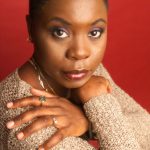Finding Me: Towards Self-Actualization in Writing
By Eugen Bacon
I read Maurice Broaddus’s “Black Joy and Afrofuturism for Young Readers,” which heartens us to be present, fully and joyfully, not just for ourselves but for our children, our new adults, and our future generations. He dares that we find unapology for being, that ours becomes an everyday commitment to a joyful resistance against carefully charted devices of oppression.
That reading nudged an inward gaze at my own writing, and I saw its trajectory:
- Please, let me…
- I am Black…
- I am here.
Please, let me…
One winter, in the 1990s, I arrived in London from Nairobi, wearing thongs—the ones for feet. I encountered a new and brutal kind of coldness, and it told me, decisively, that I had arrived at Different. As passersby went on in their winter coats, it struck me that, in my skin, I was a minority.
Back home, bubs would point at the rare mzungu, white person; here, they pointed at me. Years on, folk would look at my mixed-race son. Clearly, I had mothered the boy: he’d stolen my face. But his soft curls, his caramel color…my kinky hair, my darkness… You could see the assessments, calculations happening in their minds. It retold my difference.
And, more than anything, I wanted to belong.
This was the world in which my writing kicked off. I now look at my early protagonists, their sea-green eyes and bony frames, their milky-white skin and bouncy hair, and I know what I was saying to those white publishers, editors, and readers: “Please, let me… See, my characters look like you.”
I am Black…
In time I found ease with my difference. By now, I had migrated to Australia and wasn’t so much grappling with identity, trying to be African, trying to be Australian. I was a sum of many, betwixt. I was the self and other, a multiple embodiment. I was Black.
My writing began to encapsulate my new intimacy with this black self that was a multiplicity, an inhabitation. Accepting my Blackness in a cross-cultural duality was like coming out. I wanted to shout it from the clifftops, to bellow the marriage of self and other with urgency lest it dissolve. I needed to write myself into my fiction, boldly and distinctly, like Toni Morrison and Octavia Butler had done before me.
I was a Black woman, a mother—integral to the community.
My stories transmuted into a noticeable Blackness in place or setting, my protagonists alive in their ebony skin, woolly hair. Each writing was knowledge, evolution. It was longing, history, memory…curiosity, survival. It was a warning, a reaching, a future…
I found myself in text, and it said to me, to anyone who listened: “See, my characters look like me.”
I am here…
Then something happened. I understood it when I co-wrote a story with slipstream author Andrew Hook:
“At first I thought the skin on the person in the mirror was black, actually a chocolate velvet. Then it went white, speckled with freckles. No, a hue of caramel. Differences, nondifferences, appearing from nowhere. The hickey on my neck was rosy, now dark truffles. The lips stayed soft and full, whichever gender, just one set lightly painted in pillow talk, then bronze, sometimes peach. The eyes vacillated between crisp emerald and deep charcoal. The hair … there was no hair. Now fragments of a man, now a woman, looked back at me, comparing notes, confusing me with someone, something…
Suddenly he grabbed my elbow. He was there, dancing with me. He was here, he was there—his fresh young face, eyes lit with mischief. We were tight. We were tense. We were fluid. Assembling, reassembling. She was back, she was forth—dark sweet notes of her perfume, blue-black hair in a fringe across her face. They were handsome. They were dangerous.”
– “Messier 94,” Danged Black Thing, pages 83–84, 100.
The color, the gender of my characters… was no longer life or death. But why so?
I’d like to think of it as a form of self-actualization, an odyssey still happening in an everyday commitment to a place of belonging. My outer echoes my inner. I’d like to think that it’s a knowing, that I am secure in myself, in my characters and their place, wherever it may be. That I, we, could be any color, gender, sexuality… whichever “other” that engages with difference, and that’s okay.
As a writer, I perceive it as a shift towards belief, not perfection—because every understanding is a learning. It is choice aligned with Broaddus’s Black joy. Being present, fully and joyfully, in a place of no longer pleading acceptance, of not feeling the urge to assert my Blackness or whichever difference, but rather of being:
I am here. My characters are here. My story is here.
 Eugen M. Bacon is African Australian, a computer scientist mentally re-engineered into creative writing. Her novella Ivory’s Story was shortlisted in the 2020 British Science Fiction Association (BSFA) Awards. Her work has won, been shortlisted, longlisted or commended in national and international awards, including the Foreword Indies, Bridport Prize, Copyright Agency Prize, Horror Writers Association Diversity Grant, Otherwise, Rhysling, Australian Shadows, Ditmar Awards and Nommo Awards for Speculative Fiction by Africans. Bacon’s creative work has appeared in literary and speculative fiction publications worldwide, including Award Winning Australian Writing, BSFA, Fantasy Magazine, Fantasy & Science Fiction, Bloomsbury Publishing and The Year’s Best African Speculative Fiction. New releases: Danged Black Thing (collection), Saving Shadows (illustrated collection), Mage of Fools (novel). Website: eugenbacon.com / Twitter: @EugenBacon
Eugen M. Bacon is African Australian, a computer scientist mentally re-engineered into creative writing. Her novella Ivory’s Story was shortlisted in the 2020 British Science Fiction Association (BSFA) Awards. Her work has won, been shortlisted, longlisted or commended in national and international awards, including the Foreword Indies, Bridport Prize, Copyright Agency Prize, Horror Writers Association Diversity Grant, Otherwise, Rhysling, Australian Shadows, Ditmar Awards and Nommo Awards for Speculative Fiction by Africans. Bacon’s creative work has appeared in literary and speculative fiction publications worldwide, including Award Winning Australian Writing, BSFA, Fantasy Magazine, Fantasy & Science Fiction, Bloomsbury Publishing and The Year’s Best African Speculative Fiction. New releases: Danged Black Thing (collection), Saving Shadows (illustrated collection), Mage of Fools (novel). Website: eugenbacon.com / Twitter: @EugenBacon


